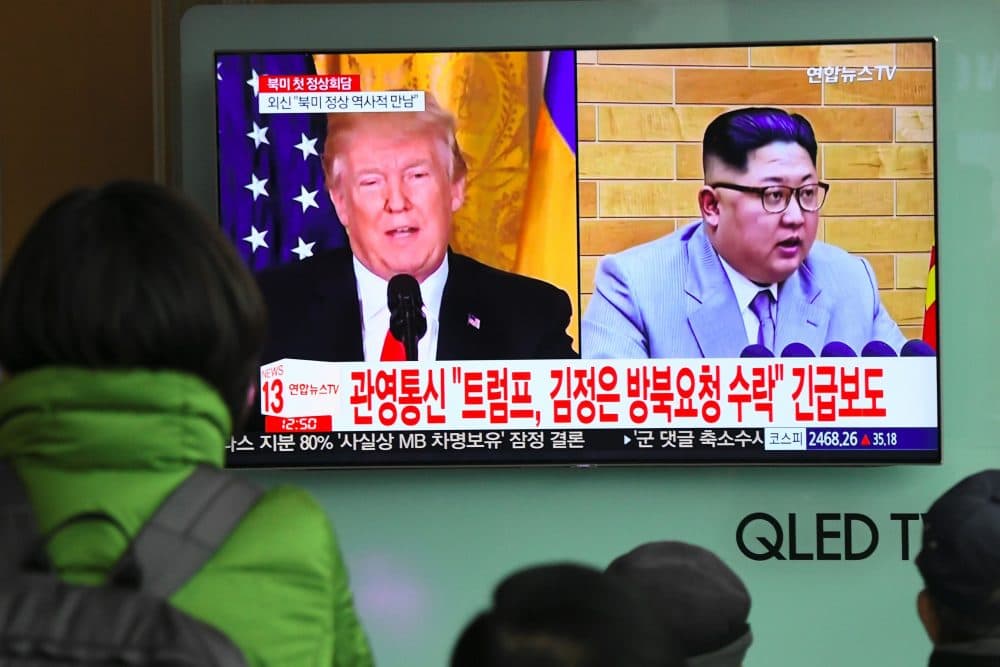Advertisement
Kim Jong Un Was Likely Planning To Approach Trump 'All Along,' Scholar Says
Resume
President Trump agreed Thursday to meet with North Korean leader Kim Jong Un for direct negotiations about that country's nuclear program.
Here & Now's Jeremy Hobson discusses the news with Sung-Yoon Lee, professor of Korean studies at the Fletcher School of Law and Diplomacy at Tufts University, who says Kim was likely planning the meeting "all along."
“After that yearlong banner ballistic year that Kim Jong Un had in 2017, it's time now to get the United States and South Korea to weaken sanctions against the North Korean regime, to buy a free pass for the next provocation, which will come," he says, "and also to change the dynamics, and to paint Trump into a corner as the aggressor, as the party less interested in peace."
Interview Highlights
On how Kim Jong Un's invitation for talks echoes his father's approach
"Kim is really taking a page out of his daddy's playbook in the year 2000. Kim Jong Il met with a South Korean leader in 2000, in the month of June, pocketed $500 million in doing so, and then invited President Clinton to Pyongyang. And the only reason that Clinton could not make that trip was due to the uncertain political scene at home in the wake of the Al Gore-George W. Bush vote recount and time simply ran out. Clinton intended to visit North Korea, and of course in late October, Secretary of State Madeleine Albright did just that. She was in Pyongyang toasting Kim Jong Il. So we have to remember that North Korea is very good at both the carrot and the stick."
"North Korea is very good at pointing the finger at the United States. It's maintained for decades that it is so-called 'hostile U.S. policy' that drives North Korea to maintain a hyper-expanded military."
Sung-Yoon Lee
On if he believes these talks will lead to a breakthrough of peace
"Well, I'm not against talking to North Korea, and I think if President Trump were to take a hard line and say at this point that I'm not interested in talking with the North Korean leader, then his critics would say ideological rigidity and all those things are hampering any chances of improvement in the relationship — even peace in the region. At the same time, what will they talk about? Kim Jong Un thus far has made no concession whatsoever for him to say in the meantime, I'm not going to conduct any more missile or nuclear tests, or I'm amenable to denuclearization talks. It's like saying, you know, I'm not going to commit anymore crime, so give me a reward.
"So what can be gained from all this? Well, if President Trump were to make any kind of advancement on getting North Korea to loosen its unprecedented censorship over its people, dismantle some of its nuclear programs, release detained U.S. citizens and South Korean citizens, if we can make progress on the incremental steps, even then I think this moment of meeting between the leader of the United States and North Korea may come to be remembered as a powerful symbolic moment. But I think the path to Pyongyang really is strewn with even more traps along the way, and it's a risky proposition."
Advertisement
On what happens if talks fall through or go south
"Well, North Korea is very good at pointing the finger at the United States. It's maintained for decades that it is so-called 'hostile U.S. policy' that drives North Korea to maintain a hyper-expanded military. For a nation of 25 million people, North Korea maintains an army well over a million. So North Korea probably will renege in my view, and looking at what happened in recent years, on Leap Day, Feb. 29, 2012, the U.S. and North Korea basically came to an agreement. North Korea agreed to suspend, to freeze its missile and nuclear weapons, a moratorium on further weapons tests. In return, the U.S. was to provide North Korea with 240,000 tons of food aid. Just 16 days later, North Korea announced that it would launch a satellite into space, which of course requires ballistic missile technology, and the Americans found themselves rather dumbfounded. How could they just lie to us straight in our face like that?
"North Korea is not shy about strategic deception. They will come up with some reason to walk away from this proposition, and they will be able to blame the Trump administration for that."
This article was originally published on March 09, 2018.
This segment aired on March 9, 2018.